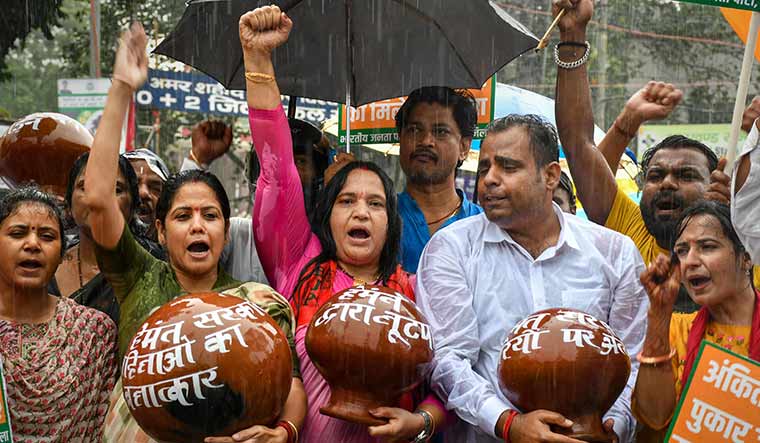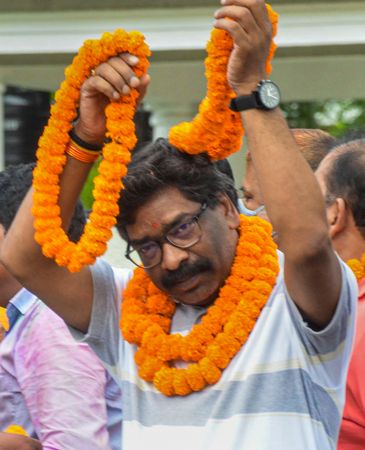WHEN BIHAR CHIEF Minister Nitish Kumar severed ties with the BJP and joined hands with the Rashtriya Janata Dal last month, eastern India became BJP-mukt for the first time in two decades. The party is currently not part of governments in Bihar, Jharkhand, West Bengal and Odisha. Earlier, it had ruled Jharkhand on its own, and was part of Bihar and Odisha governments.
The BJP remains a force in all four eastern states, but the satraps have ensured that it does not hold as much sway in the east as it does over other regions. The situation has presented a worrying possibility for the saffron party: If it loses Karnataka after the assembly elections next year, it can again be labelled as a north Indian party. Politics is about perception, so the BJP is fighting to ward off that tag.
Hence, the BJP is eyeing Jharkhand with anticipation. The state is in the midst of a governance crisis, as the Election Commission recently recommended that Chief Minister Hemant Soren be disqualified as MLA for having allotted a mine to himself while in office.
For the BJP, weakening the coalition government led by Soren’s Jharkhand Mukti Morcha is an excellent opportunity to gain the upper hand in the tribal-dominated state. It is the third state in as many months to witness political upheavals. The other two—Maharashtra and Bihar—witnessed realignment of alliances and formation of new governments. The BJP hopes for a repeat in Jharkhand.
“Let the law take its own course. We are not saying anything more than that,” said state BJP president Deepak Prakash. Apparently, the party does not want to be seen as having engineered the crisis for breaking the ruling coalition.
The situation marks another episode in the BJP’s clash with opposition parties, especially regional ones that dominate some states. In its national executive meeting in July, the BJP had calibrated its strategy to target regional parties that posed a challenge to its expansion.
The Soren government has been under pressure because of investigations into mining-related allegations. In May, the Enforcement Directorate arrested IAS officer Pooja Singhal, who was mining secretary, on charges of money laundering and embezzling funds allotted for the National Rural Employment Guarantee Scheme. The ED seized Rs17 crore in cash from Singhal’s residence and other locations. In July, the agency arrested Pankaj Mishra, Soren’s political aide, in another money laundering case.
The complaint against Soren was filed by BJP leaders. The Election Commission soon conducted an inquiry and its recommendation is now with the governor. If Soren is disqualified as MLA, he would have to resign as chief minister as well. If the governor’s recommendation is limited to cancelling his election victory, Soren could continue as CM by having the party elect him once again as leader of the legislative party. He would then have six months to win an assembly seat.
Speculation is rife that, if forced to step down, Soren would instal his wife, Kalpana, or younger brother Basant as chief minister. His father, Shibhu Soren, would also have a say in the matter. But, whoever becomes chief minister, the reins of the government would be with Hemant. “Hemant Soren is the chief minister; he will remain chief minister,” said Vinod Kumar Pandey, JMM general secretary.
The government recently called a special session of the assembly to conduct a floor test. While it did not serve any real purpose, the vote of confidence was a victory for Soren in terms of perception.
“We have told the governor that the political uncertainty in the state is his doing, as the Raj Bhavan has taken no action on the Election Commission’s recommendation,” said Pandey. “Selective leaks are damaging the atmosphere. Development of the state is getting hampered. We had to take our MLAs [to safety] because of threats from the BJP. They are responsible for this crisis.”
In the 81-member assembly, the JMM has 30 seats. Its allies, the Congress and the RJD, have 16 and 1, respectively. Though the BJP has just 26 seats, the ruling coalition fears a repeat of what happened in Madhya Pradesh and Uttarakhand, where governments fell after legislators abruptly switched sides.
The BJP has ruled Jharkhand for around 13 of 22 years of its existence. Party leader Raghubar Das was the first to complete a full five-year term in office. The state has 14 Lok Sabha seats, of which the BJP won 12 in the previous two polls.
If Soren is punished, the JMM could make a retaliatory move in the assembly. The speaker has reserved judgment in a complaint regarding leader of the opposition Babu Lal Marandi’s alleged violation of the anti-defection law. Marandi was the leader of the Jharkhand Vikas Morcha when he and two of his party colleagues won assembly seats in 2019. The two colleagues later joined the Congress, while Marandi joined the BJP. An influential Santhal leader, Marandi was Jharkhand’s first chief minister. He defeated Shibhu Soren, also a Santhal, which enabled his swift rise in the BJP.
Marandi is important for the BJP, as the party had failed to retain power with a non-tribal as chief minister (Raghubar Das). A similar experiment in Maharashtra had also yielded the same result. The BJP now supports a Maratha chief minister (Eknath Shinde), while the Brahmin face that headed the previous BJP-led government (Devendra Fadnavis) has been made deputy chief minister.
Tribals constitute more than 26 per cent of Jharkhand’s population. The BJP has been wooing them for the past two years with a number of initiatives. It was with an eye on the tribal votes that the BJP made Droupadi Murmu India’s first president from the tribal community. That the state has 40 per cent of the country’s mineral resources also makes it attractive to political parties.
The BJP is banking on help from constitutional bodies, because it does not want to be seen as eager to dislodge a government headed by a tribal. In the previous elections, the JMM-led coalition had won 25 of 28 reserved seats, while the BJP could manage to win only two. It was tribals who voted the BJP out of power.
Apart from raising corruption allegations, the BJP is highlighting the poor law-and-order situation in the state. Party leaders allege that the Soren government is doing “appeasement politics” and that there have been cases of love jihad in the state. “The state is hit with multiple cases [of love jihad], and the chief minister says these incidents keep on happening. What kind of CM is he?” said Prakash.
By appointing Prakash, a non-tribal leader, as state BJP chief and Marandi as the leader of the opposition, the BJP is trying to carefully balance its politics. Allegations against the Soren government are being levelled with much care, as the party does not want to be accused of targeting tribals. It also plans to play the nepotism card if Soren instals a relative as chief minister.
For now, rumours are rife about why the governor is delaying his decision on disqualifying Soren. In July, as the BJP’s state unit was going hammer and tongs against the government, Soren visited Amit Shah in Delhi. The same month, Modi visited Jharkhand and surprisingly spared Soren in his aggressive speech against opposition parties. This had led to talk that the JMM and the BJP, which had been allies earlier, were moving closer again.
With the governor delaying his decision, observers now have one big question: Is there a surprise in store?



